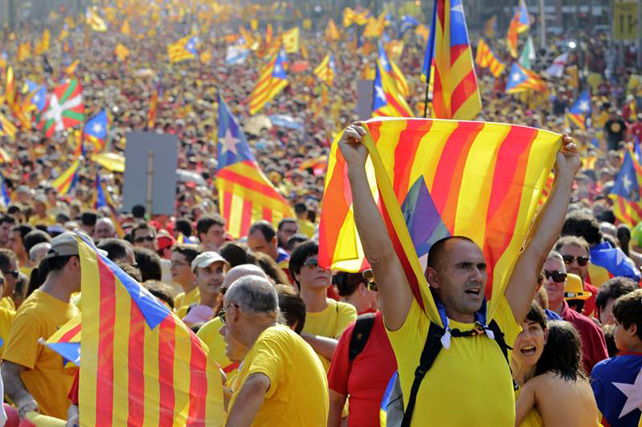The military-tutored "democracy" in the Kingdom of Spain is clearly collapsing as we speak. Almost 40 years after the death of dictator Franco, his brainchild, the restored Bourbonist constitutional monarchy, integrated in NATO and EU, is dying too. And the almost unnoticed recent change in the identity of the unelected monarch is just a symptom (the former King resigned as the popularity of the Franco's appointed monarchic institution was collapsing, amidst corruption scandals that shatter the whole political establishment, in a rather desperate attempt to refresh the decadent dynasty with a new untested face).
Catalonia
In three days there will be a referendum in Catalonia for independence almost certainly. It has been declared illegal but it is clear that it cannot be canceled unless whole military occupation of the country is implemented overnight, something that is certainly not impossible but seems quite unlikely to succeed.
Catalonia, with 16% of the population of the State and probably a larger share of its economy, is almost certainly way too large and its independence movement way too massive, able to take millions to the streets, to be just tackled with a mere military intervention. Never mind the correlative loss of prestige internal and external of the Spanish regime if they dare to do that.
What exactly will happen we will only know on November 9th and rumors abound as a military convoy of 15 armored vehicles, apparently transporting infantry and weapons, crossed through Barcelona yesterday, and a video showing military units being trained for mass unrest quelling has also raised quite an scandal.
Collapse of the twin party
But surely even more important is the fact of the neo-francoist political establishment suffering a very clear collapse, with the new party Podemos (We Can), which has copied its program almost literally from that of United Left but has a distinct approach to grassroots participation in politics, leading by quite a margin in the most recent official opinion polls (Barómetro CIS Oct. 2014).
Asked about spontaneous vote intention in hypothetical elections tomorrow (question 23), 18% of Spaniards answered that they'd vote for Podemos, followed by 15% for the social-libera PSOE and only 12% for the conservative PP (currently in power). Interestingly, support for the traditional leftist option United Left (coalition around the Communist Party and akin to Greek Syriza although with a more elderly leadership that seems to lack enough charisma) also appears to fall, not reaching 4% in this question.
The combined vote intention plus sympathy compound (table 24b) also places Podemos first in the opinion poll, with 19% of overall popular support, closely followed by the center-left PSOE (18%) and at some distance by the right-wing ruling party PP (14%).
It is interesting to notice that the average popular perception of Podemos, which insists of disdaining the left-right classical polarization, is slightly farther to the left than that of United Left: 2.4 vs 2.7 in a scale where 1 is absolute left and 10 absolute right. Only Amaiur (now EH Bildu, Basque Nationalist Left coalition) is perceived as further to the left, with a 2.2 score.
It is also interesting to notice that the right-wing parties PP and its Navarrese ally UPN lead the extreme distrust results (question 16), with 60% declaring that they would never vote to the PP and (in Navarre only) with 88% declaring that they will not vote to its local ally UPN. Both are ruling in their respective areas and both have been shattered by massive corruption and mismanagement scandals.
The UPN data evidences that the political situation in Navarre will no doubt change quite radically when local and regional elections are held next spring.
In this question, the best scoring parties are the Catalan Republican Left (ERC) which gets a 3.7 average (on a 1-10 scale) in Catalonia and Podemos with 3.1 (state-wide). These results clearly emphasize the kind of seismic shift that is happening in the Spanish state.
However it must be said that the twin party still probably has enough support to muster a narrow majority in Congress, notably considering the heavily biased Spanish electoral system that strongly favors rural provinces (where sociological change is generally slower and small parties' options almost nil). The deadline for general elections is just a year away and the examples of Italy and Germany show that NATO's quasi-official twin parties are willing to join forces to prevent the much demanded change from happening.
On the other hand it is not impossible that a snowball effect of sorts attracts even more support to the Podemos phenomenon and hence even that "solution" becomes impossible. In any event, it is clear that the desire for radical change is crystallizing in various forms and that, especially considering its traditional trans-Atlantic links with Latin America, where similar political phenomena (Bolivarianism and also other left options) have been growing in the last decades, the State of Spain becomes a vortex of change in old Europe in the short run.
We will see.


No comments:
Post a Comment
Please, be reasonably respectful when making comments. I do not tolerate in particular sexism, racism nor homophobia. The author reserves the right to delete any abusive comment.
Comment moderation before publishing is... ON